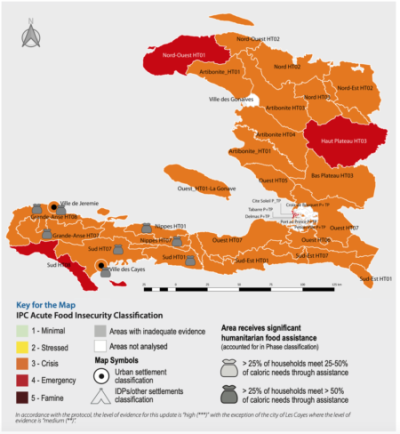
In Haiti 4.5 million people are experiencing high levels of food insecurity today, with roughly 45% of the population expected to face severe hunger over the next several months; 1.3. million of them are in an emergency situation. Based on IPC classifications of food insecurity, all of Haiti's regions are at level 3 or 4, meaning that in every department, there is hunger. Level 3 means there is either not enough food, or people can only eat enough if they forego other necessities. At level 4, or emergency levels of food insecurity, there are large gaps in meeting daily requirements that are reflected in leading to wide-spread malnutrition. Level 5 is famine.
In 2019 the number of people at the stressed level (3 or higher) represented 35% of the population. The crisis today is both significantly worse - and was clearly predictable.
Stories about the crisis identify a variety of reasons for increasing food insecurity: Disruptions to food systems and aid delivery as a result of the earthquake in August of 2021; increases in fuel prices that are driving inflation, made much worse by the war in Ukraine; personal insecurity across the country that impacts aid delivery, as well as access to markets for farmers trying to sell produce; and then, there was flooding in different parts of the country in January, followed by drought in March.
All of this is true. However, underlying these crises, indeed making them much worse, is long-standing systemic issues reflective of the colonial and neo-colonial relationships that shape opportunities in Haiti. The United States, for example, has through the years leveraged Haiti's debt into policy reforms that lower agricultural tariffs and give open access to US corporations to Haitian labor and resources. Recurrent food emergencies also become a means to dump and/or monetize food aid in ways that destroy local markets in the long run, creating more dependency on imported food.
One result of this destruction of Haitian agriculture is that Haiti has undergone a massive urbanization process over the 36 years since Jean Claude Duvalier was forced from power. From nearly 80% of the population still living in rural areas in 1986, the number today is less than 45% - and the overall size of the population has, of course, increased significantly. Cities are strained to provide services, and formal employment opportunities are insufficient to support families. Port-au-Prince has 1 million more people living in it today than the day before the earthquake in 2010 -, and the overcrowded conditions then were a major factor in the high death count.
Accompanying all of this, is the slow deterioration of the state's capacity to govern under the relentless pressure of loan conditionalities from the International Monetary Fund, and other donors. In order to service debts, Haiti has been forced to cut public expenditures such that today it has the lowest public sector employment rate in the Caribbean. Even the police force, which has received significant funding from international donors for training and materials, is underpaid leading to strikes as well as well-documented corruption.
The crises in Haiti today are thus very much a product of the intersections of institutional and environmental degradation over many years, with deep roots both inside and outside of the country. Addressing environmental degradation thus requires local and international action.
It is this broader understanding that guides our work at the Quixote Center, where we both support and accompany communities in the Gros Morne area alongside the staff of the Jean Marie Vincent Formation Center, while also working to confront ongoing US interventions that erode the long-term prospects for democracy and security.
The environmental movement gave us the “think global, act local” strategy. While today the saying might hit one with the depth of a bumper sticker, the reality is that this remains a very necessary framework for action on the environment, and for justice more broadly. We all share a human ecology, and with it a common destiny. Earth Day is a good time to reflect on what that means, and then act accordingly.

